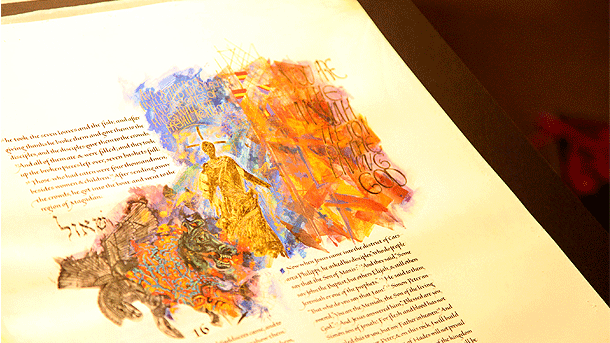

Know the Scriptures, know Christ
Sebastian Gomes
Friday, September 19, 2014

 At Salt and Light, we make a concerted effort to keep alive the memory of the Second Vatican Council. It’s not, as some might think, because we appreciate history. It’s because we look to the future.
Those Catholics who are familiar with the history and context of Vatican II and with the sixteen official documents it produced can appreciate the courage and wisdom of the Council Fathers to construct a road map for our times on essential issues like the Church in the modern world (Gaudium et Spes) and the role of the Laity in the life of the church (Apostolicam Actuositatem).
But, interestingly enough, a strong argument can be made, and is made, for the primacy of another Council document that at first may not appear to be particularly novel. It’s the document on Divine Revelation, the word of God (Dei Verbum).
Today access to the Scriptures is taken for granted. We even hear Pope Francis regularly instructing the faithful to carry a little book of the Gospels around, “in your purse, in your pocket, and read a passage from the Gospel during the day.” (Morning homily, Sept. 1, 2014)
But widespread reading and study of the Scriptures is a modern phenomenon. It was indeed a development when in 1965 the Council Fathers urged all Christians:
At Salt and Light, we make a concerted effort to keep alive the memory of the Second Vatican Council. It’s not, as some might think, because we appreciate history. It’s because we look to the future.
Those Catholics who are familiar with the history and context of Vatican II and with the sixteen official documents it produced can appreciate the courage and wisdom of the Council Fathers to construct a road map for our times on essential issues like the Church in the modern world (Gaudium et Spes) and the role of the Laity in the life of the church (Apostolicam Actuositatem).
But, interestingly enough, a strong argument can be made, and is made, for the primacy of another Council document that at first may not appear to be particularly novel. It’s the document on Divine Revelation, the word of God (Dei Verbum).
Today access to the Scriptures is taken for granted. We even hear Pope Francis regularly instructing the faithful to carry a little book of the Gospels around, “in your purse, in your pocket, and read a passage from the Gospel during the day.” (Morning homily, Sept. 1, 2014)
But widespread reading and study of the Scriptures is a modern phenomenon. It was indeed a development when in 1965 the Council Fathers urged all Christians:
“…to learn by frequent reading of the divine Scriptures the "excellent knowledge of Jesus Christ" (Phil. 3:8). "For ignorance of the Scriptures is ignorance of Christ." Therefore, they should gladly put themselves in touch with the sacred text itself, whether it be through the liturgy, rich in the divine word, or through devotional reading, or through instructions suitable for the purpose and other aids…” (Dei Verbum, 25)This document on Divine Revelation is not merely one element of the ecclesial vision of Vatican II. It is a cornerstone, precisely because it is a perpetual starting point; with the Scriptures a church can always be built. At the same time, there is the great challenge today of educating Christians about the Scriptures. Valid questions from our contemporaries can be asked of any of us: how well do you know the Scriptures? What does it mean to know the Scriptures? How do you interpret the vicissitudes of history in light of the Scriptures? What do the Scriptures say in the context of our world today? How are they unique from other religious texts or holy books? In our educational series The Church Alive, the Scriptures are brought to life in the context of our ongoing discussion on the New Evangelization. The accompanying study guide contains thirteen in-depth biblical reflections for personal use or group study sessions. It was natural for us to include this most essential element in the project. As the Bishops at the 2012 Synod on the New Evangelization wrote:
“Frequent reading of the Sacred Scriptures… is not only necessary for knowing the very content of the Gospel, which is the person of Jesus in the context of salvation history. Reading the Scriptures also helps us to discover opportunities to encounter Jesus, truly evangelical approaches rooted in the fundamental dimensions of human life: the family, work, friendship, various forms of poverty and the trials of life.” (Message to the People of God, 4)Today there are all kinds of programs and self-help initiatives designed to help people live more deeply meaningful or happy lives. In the Church we are encouraged to practice spiritual exercises, to participate in the sacraments and pray on a daily basis. An informed and educated frequent reading of the Scriptures should be near the top of that list. And remember, there are two moments of encounter with the Real Presence at Mass: in the Eucharist, and in the word of God.
Related Articles:
>>
SUPPORT LABEL
$50
$100
$150
$250
OTHER AMOUNT
DONATE
Receive our newsletters
Stay Connected
Receive our newsletters

Stay Connected









